As judicial panels of inquiry into police brutality continue to sit, horrible and alarming details of brutality emerging from victims’ accounts show how brutal and callous a state institution charged with protecting lives, properties and instilling public order can be if left to operate without accountability, Gabriel Atumeyi reports.
Power, it is said, corrupts and absolute power, corrupts absolutely. No where does this dictum seem to sound truer than in the case of the Nigeria Police versus citizens of the Federal Republic of Nigeria.
When distraught youths and other citizens, after decades of official repression, rose in protest last October to demand an end to the Special Anti-Robbery Squad (SARS) and general police brutality, it was, perhaps, because they had reached the limits of human endurance. The abnormal, by the standard of best practices, seemingly became the norm, choking and suffocating citizens as the police became both judges and executioners in situations of alleged breaches of social rules or penal codes.
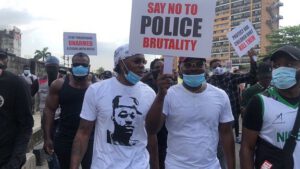
In a country where majority of its population are barely educated and poor; many do not understand civil procedure rules and, therefore, do not know how to readily access justice; and where sentiment is elevated above constituted authority as the sole dispenser of truth, the sword of justice appears blunt.
Or, as it is in the case of the Nigerian police, the trigger is often pulled without recourse to judicial pronouncements as provided for in the constitution. The ensuing climate was one of fear, anxiety and a trail of indiscriminate bloodletting, while the phrase, “police is your friend” became nothing but a metaphor for extortion and cover up.
Shots have been fired and mayhem and confusion have followed the EndSARS uprising, but in a last minute concession, the administration of President Muhammadu Buhari urged state governors to set up panels of inquiry across the states of the Federation to investigate these atrocities and abuse of human rights.
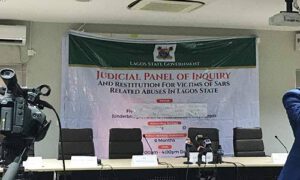
As expected, public hearings of the panels have revealed gruesome and morbid tales that have no place in a civilized society.
Even though some of the tales recounted had longed occurred, the anguish and sorrows of friends and relatives remain fresh.
With about 26 states having active panels of inquiry, and petitioners trooping in to register their prayers, cases have been piling up.
For reasons of brevity, 365Daily decided to highlight only few of the most brutal tales that underline man’s inhumanity to man, and the inhumanity of supposed agents of the law. The temerity of their omissions seems to border on a ready acceptance of lawlessness that amounts to recklessness and the absolute abandonment of law and processes as the conscious of society.
At the Lagos judicial panel two weeks ago, the entire hall was emotion laden as the public heard the gruesome case of a 54-year-old who eventually died in the course of the setting up of the judicial panel.
According to a family member, Chukwu Vincent, who testified on behalf of the family of the bereaved, his cousin (Cheta) who sold electronics at the popular Alaba market, was arrested in 2014 on his way back from the market at Igando area of Lagos. He was taken to the Igando Police Station where he was detained and tortured, leading to paralysis and a brain tumor, leaving the family with the burden of seeking medical care.
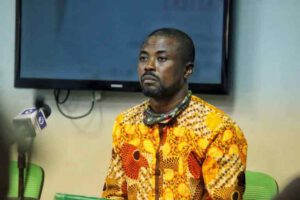
*Chukwu
The Police would later inform the family that the victim looked like a suspect and that was why he was arrested, kept in police custody for 21 days and later released with life- threatening injuries.
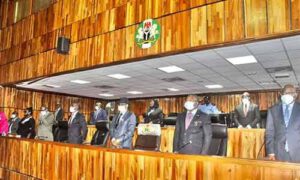
*NHRC Panel on EndSARS
Similarly, before a nine-member panel set up by the National Human Rights Commission (NHRC), a woman known as Doris Idebia, penultimate Wednesday, during a hearing on allegations of human rights violations by the police, narrated how her brother died after being tortured by officers of the now disbanded SARS.
She told the panel that a police inspector simply identified as Kingsley, tortured her brother, Festus Idehen, to death in 2016 over an accusation that he stole a car. She said he was moved from Kaduna to Abuja.
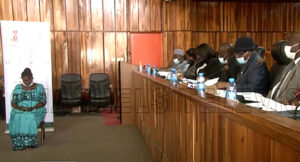
*Idebia making presentation to the panel
According to her, Idehen died as a result of the torture on September 6, 2016, three days after he was arrested. She added that even after Idehen’s death, the police refused to release his corpse to the family.
Another equally shocking account is that of how physically challenged Francis Idum was shot in the head, allegedly by a SARS operative identified as Hakeem Muhammed, aka Skoda, at Ajisegin street in Ilupeju, Lagos.
One of the witnesses, Kayode Omotosho, an official of the Christ Apostolic Church, Victory Land, Ilupeju, disclosed to the Lagos Panel that he was with the victim on that fateful day, as he (Idum) was a member of the Men’s Association, a group which chairman he is.
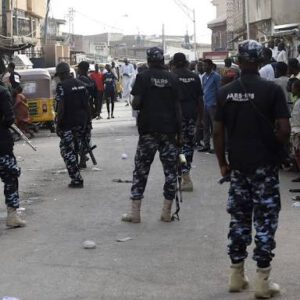
*File photo of SARS operatives
He said three hours after they separated, he got word of the death of the victim. Upon hurrying up to the place of the incident, he met chaos caused by mob action in reaction to the ugly incident. Agba, as the victim was fondly called, was a cleaner.
According to Omotosho, he was killed by a stray bullet from the gun of a SARS officer, apparently well known in the area, in the course of a chase.
He stated that a police spokesperson later issued a statement, saying Idum was felled during a clash between hoodlums.
Going further, he added that when the police dispersed the crowd in the area, they retrieved the victim’s corpse and dumped it in a container at a mortuary in Yaba, were bodies were kept for mass burials.
Other witnesses at the panel, including the Deputy Registrar of Yabatech, corroborated this story.
Another equally chilling account is the case of one Daniel Agori who was killed by SARS operatives in the presence of his mother. In a replay of the experience – which was relayed to the NHRC panel in Abuja – said to have happened in Rivers state, the victim’s mother, Victoria Agori and her two sons, the late Daniel and David and one Silver Ogbonna, Daniel’s fiancé, were reportedly bundled to the unit’s command at Aluu in Ikwerre, Rivers state on May 10, 2019, after alleging that the victim was a kidnapper and cultist.
On arrival at the station, after a brief chat between two officers identified as S.P Justine Adaka and DSP Yusuf Bello, the deceased was allegedly detached from a joint handcuff and blindfolded with a shirt and shot to death at point blank range. The deceased’ mother was also assaulted with the nozzle of the gun.
Or, is it the case of one Samuel Imaikop who was murdered alongside three of his labourers on November 24, 2013, along the Benin – Auchi road by SARS operatives and hurriedly buried in a shallow grave?
This much was revealed days ago at the Edo State EndSARS judicial panel by wife of the deceased, Patience Imaikop.
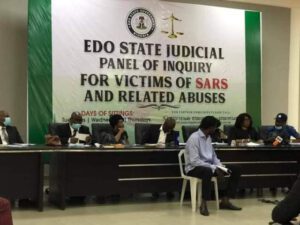
*Edo State Judicial Panel
As the days go by and more shocking revelations emerge, it remains unclear what the end game of the Buhari-led administration would be, especially as it concerns allaying public anger in a way that justice would be seen to have been done.
Speaking to 365Daily, legal luminary, Femi Falana (SAN), said he would not rush to conclusions like the military and the Minister of Information, because it would be prejudicial. “The panels are still going on, let us wait for the revelations that will be coming,” he said.
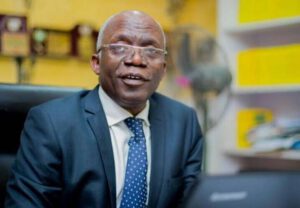
*Falana
Also commenting about these revelations, Innocent Lagi, a former Attorney General of Nassarawa State, contended that the problem lay in the fact that policing in the country hinges on brutality.
“The police is embarrassing to the citizens in and outside the country. The police is poorly funded and extremely corrupt,” he said.
In a chat with 365Daily, the acclaimed heroine of the EndSARS protest, Aisha Yesufu, revealed that the judicial panels are a good development as people were now telling stories that would otherwise never have been heard.

*Yesufu
“A lot of people have been brutalized and we should be asking questions. Who is in control of the police? The police has gone rogue on its leadership and also on the Commander – in – Chief.”